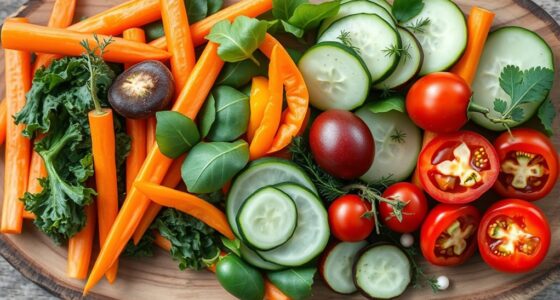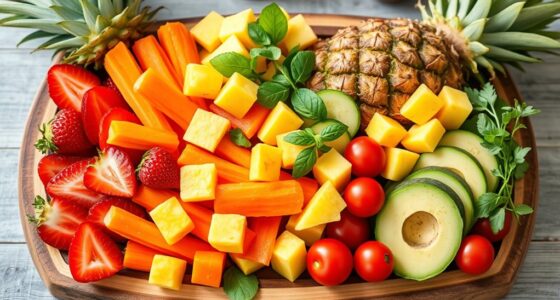Essential enzymes in raw foods, like proteases, amylases, lipases, and others, help your body break down proteins, carbs, fats, and plant fibers more efficiently. They support digestion, reduce bloating, and improve nutrient absorption, boosting your overall gut health and immunity. Fresh, minimally processed raw foods preserve these enzymes, making them more effective. To discover how each enzyme benefits your health and the best ways to preserve them, keep exploring further.
Key Takeaways
- Raw foods contain natural enzymes like proteases, amylases, lipases, and cellulase that aid in digesting proteins, carbohydrates, fats, and fiber.
- Enzymes such as bromelain and papain support protein digestion and reduce inflammation, enhancing gut health and recovery.
- Preserving enzymes through proper raw food handling boosts nutrient absorption and reduces digestive discomfort.
- Enzymes like lactase help break down lactose, improving digestion of dairy and aiding those with lactose intolerance.
- Active enzymes contribute to overall health by supporting digestion, reducing oxidative stress, and enhancing immune function.
Proteases and Their Role in Protein Digestion
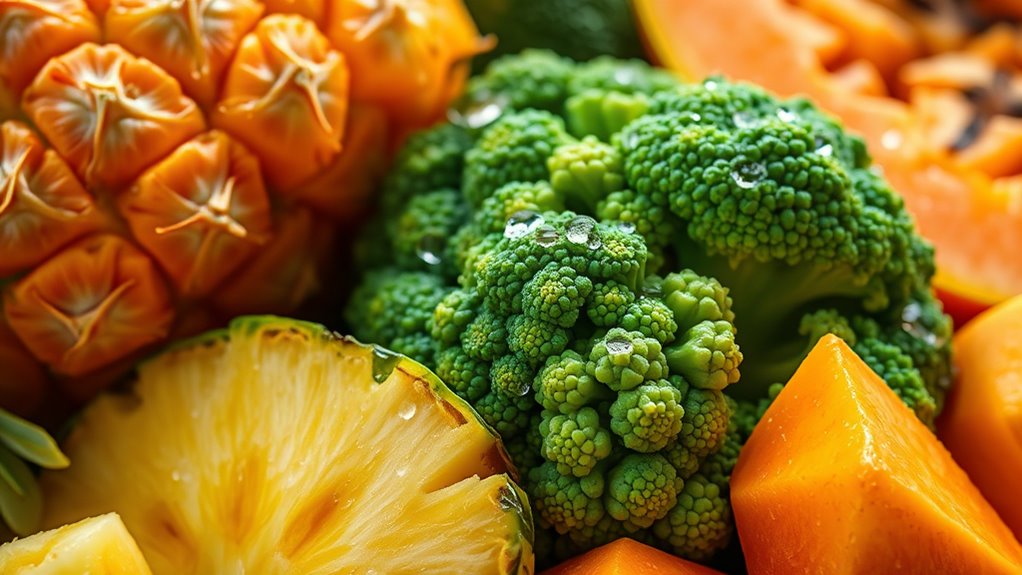
Proteases are vital enzymes that break down proteins into smaller peptides and amino acids, making them easier for your body to absorb. Their effectiveness depends on enzyme stability, which can be influenced by temperature, pH, and storage conditions. When consuming raw foods, the natural proteases help initiate digestion early, supporting better nutrient absorption. Preserving these enzymes in raw foods is essential because heat can deactivate them, reducing their activity. Proper raw food preservation techniques, like refrigeration or minimal processing, help maintain protease activity and enzyme stability. This preservation not only ensures maximum enzymatic benefits but also maintains enzyme activity, which is crucial for optimal digestion. Additionally, understanding enzyme stability can help you choose the best methods to preserve these enzymes during storage. By keeping proteases active through careful preservation, you enhance the natural enzymatic processes your body relies on for efficient protein breakdown. Proper handling and storage of raw foods can also prevent the destruction of enzyme activity, thereby supporting overall digestive health. Moreover, selecting raw foods with high enzyme content can further boost digestive efficiency.
Amylases: Breaking Down Carbohydrates Naturally

Amylases are enzymes that help your body break down carbohydrates into simpler sugars, making energy more accessible. Natural amylases in raw foods offer benefits like improved digestion and better nutrient absorption. You’ll find the highest concentrations in raw fruits, sprouted grains, and certain root vegetables. Incorporating effective fraud prevention tools in transaction processing can further protect your financial activities.
How Amylases Function
Amylases are natural enzymes that play a essential role in breaking down starches into simpler sugars like maltose and glucose. They work by cleaving the bonds within carbohydrate molecules, making digestion easier. Their effectiveness depends on enzyme stability, which can be affected by factors like pH and temperature; if conditions aren’t ideal, enzyme activity decreases. Some foods contain enzyme inhibitors that naturally hinder amylase function, helping preserve starches until you’re ready to digest them. When you consume raw foods rich in amylases, these enzymes remain active, facilitating the breakdown process in your mouth and stomach. This natural activity allows your body to absorb nutrients more efficiently, supporting overall digestion. Understanding how amylases function helps you appreciate their role in maintaining healthy carbohydrate metabolism. Incorporating foods high in amylases can also support enzyme stability, ensuring optimal digestive benefits. Additionally, consuming a variety of raw foods helps maintain the balance of digestive enzymes, promoting overall gut health.
Furthermore, a diverse diet can enhance the natural enzyme production within your body, optimizing digestion and nutrient absorption.
Benefits of Natural Amylases
Have you ever wondered how natural enzymes in raw foods support your digestion? Natural amylases play a pivotal role by efficiently breaking down carbohydrates into simpler sugars, making nutrients more accessible. Their enzyme stability allows them to remain active at room temperature, which helps preserve the raw food’s freshness and nutritional value. This preservation is essential because it prevents early spoilage and maintains the food’s natural enzymes, ensuring maximum health benefits. When you consume raw foods containing active amylases, your body benefits from easier digestion and better nutrient absorption. Plus, these enzymes reduce the need for added processing or artificial preservatives, promoting a more wholesome diet. Overall, natural amylases support your digestive health while simultaneously aiding raw food preservation.
Best Raw Food Sources
Raw foods naturally contain enzymes like amylases that help break down complex carbohydrates into simpler sugars, making digestion easier. To maximize enzyme activity, choose fresh, minimally processed foods, as enzyme stability diminishes with heat and prolonged storage. Good sources of natural amylases include sprouted grains, raw potatoes, bananas, and honey, which retain their enzyme content through proper raw food preservation. These foods preserve enzyme activity better than cooked or processed options, ensuring you get the full benefits of natural amylases. Incorporating these raw sources into your diet supports efficient carbohydrate breakdown and promotes overall digestive health. Additionally, understanding the role of enzymes in digestion can help optimize your raw food choices for better health outcomes. Proper raw food preservation techniques are essential to maintain enzyme stability and maximize health benefits. Remember, the key to harnessing these enzymes lies in selecting fresh, raw foods and practicing proper raw food preservation techniques to maintain their enzyme stability. Moreover, being aware of potential pitfalls in adopting new payment technologies can help businesses make informed choices when integrating merchant services into their operations. To further enhance enzyme activity, consider how storage conditions impact the longevity and effectiveness of these enzymes in raw foods.
Lipases and Fat Metabolism in Raw Foods
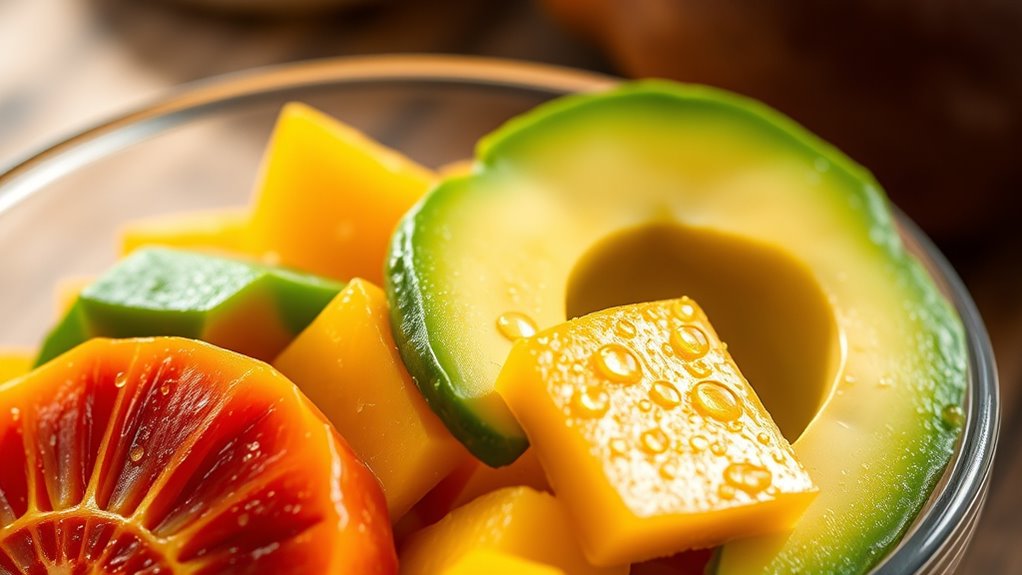
Did you know that lipases play a crucial role in breaking down fats within raw foods? These enzymes activate during food digestion, helping your body efficiently process healthy fats. In raw foods, lipases work through enzyme synergy, enhancing fat breakdown and absorption. This process not only supports your energy levels but also aids in raw food preservation by preventing fat rancidity. When you consume unprocessed, enzyme-rich foods, lipases assist in maintaining the integrity of fats, ensuring they stay beneficial longer. Proper fat metabolism relies heavily on lipases’ activity, which is naturally present in many raw plants and animal products. Incorporating raw foods high in lipases can improve digestion and optimize nutrient utilization, making your diet more effective and healthful.
Bromelain: an Enzyme From Pineapple With Anti-Inflammatory Properties

Bromelain, an enzyme found in pineapple, offers notable anti-inflammatory benefits that can help reduce swelling and pain. It also supports your body’s enzymatic digestion, making nutrient absorption more efficient. Incorporating pineapple into your diet can boost your overall health with these natural advantages. Additionally, bromelain may aid in digestive health by breaking down proteins more effectively. Its ability to improve enzyme activity in the digestive system further enhances nutrient breakdown and absorption. Moreover, research indicates that bromelain’s anti-inflammatory properties can assist in managing chronic inflammation, promoting overall wellness. Furthermore, some studies suggest that bromelain can positively influence immune response, aiding your body’s defense mechanisms.
Anti-Inflammatory Effects
Because of its potent anti-inflammatory properties, bromelain—a powerful enzyme found in pineapple—has gained attention for reducing swelling and pain associated with injuries and chronic conditions. It works by breaking down proteins that cause inflammation, promoting faster recovery. To maximize bromelain’s benefits, consider enzyme synergy, combining it with other anti-inflammatory foods and enzymes for enhanced effects. Incorporating pineapple into your diet is a simple dietary recommendation, but you can also take supplements if needed. Consuming bromelain regularly may help lower inflammation levels and support joint health. Keep in mind that individual responses vary, so consult with a healthcare professional for personalized advice. Overall, bromelain’s anti-inflammatory effects make it a valuable addition to an anti-inflammatory diet.
Enzymatic Digestion Support
Have you ever wondered how pineapple aids your digestion? Bromelain, the enzyme found in pineapple, helps break down proteins, supporting your digestive process. To maximize its benefits, enzyme stability is essential; fresh, raw pineapple retains more active bromelain than cooked or processed versions. When preparing raw foods, it’s best to consume pineapple soon after cutting since enzyme activity diminishes with exposure to heat or air. Proper raw food preparation techniques can help you maximize nutrient retention and enzyme activity. Incorporating raw pineapple into your diet can enhance digestion by assisting protein breakdown, reducing bloating, and easing discomfort. Proper raw food preparation ensures you preserve bromelain’s enzymatic power, making it a natural aid for digestive health. So, enjoy pineapple fresh to take full advantage of its enzymatic digestion support. Enzyme stability is key to maintaining its beneficial effects. Additionally, understanding raw food preparation techniques can help you maximize nutrient retention and enzyme activity.
Pineapple Health Benefits
Pineapple offers more than just a sweet taste; it also provides significant health benefits thanks to its powerful enzyme, bromelain. This enzyme has anti-inflammatory properties that can help reduce swelling and support recovery from injuries. Bromelain’s enzyme stability is vital for maximizing its benefits, especially when consuming raw pineapple, where heat can deactivate it. Incorporating pineapple into your raw food preparation ensures you preserve this enzyme’s potency, allowing your body to fully absorb its benefits. Besides its anti-inflammatory effects, bromelain aids digestion by breaking down proteins, making it a valuable addition to your diet. Enzyme stability is crucial for maintaining the health benefits of bromelain, emphasizing the importance of consuming pineapple raw to maximize its effects. By eating raw pineapple, you harness the full potential of bromelain, helping boost your immune system and promote overall wellness. Additionally, understanding the trustworthiness of AI models like GPT-4 is essential for ensuring safe and reliable health information.
Papain: the Digestive Enzyme From Papaya
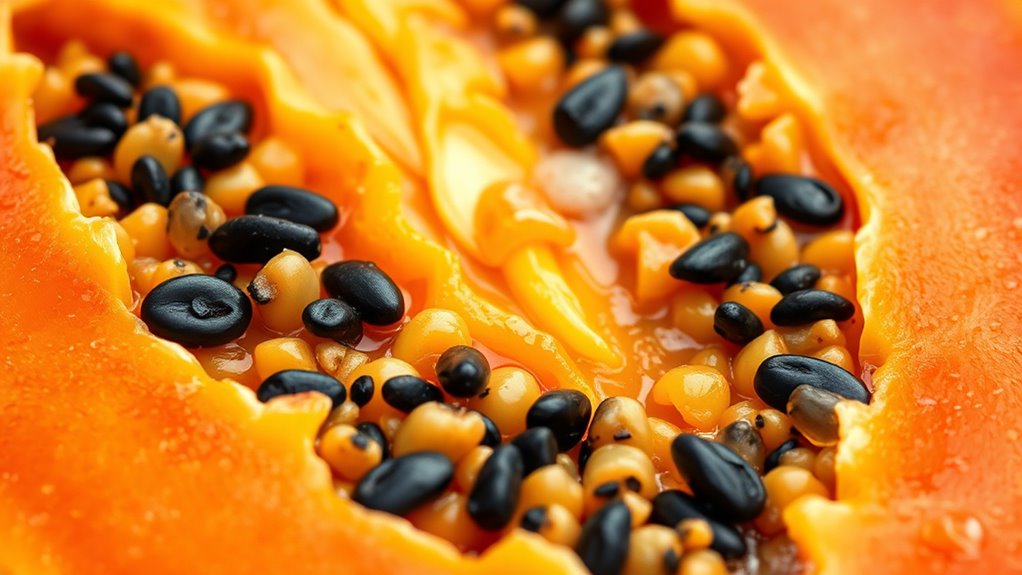
Papain, a powerful enzyme found in papaya, plays a vital role in aiding digestion. It helps break down proteins into amino acids, making nutrients easier to absorb. When preparing raw foods, enzyme stability is essential; fresh, unprocessed papaya preserves the enzyme’s activity, guaranteeing maximum benefits. Cooking or heat can denature papain, reducing its effectiveness, so consuming it raw is best. Incorporating ripe papaya into your diet can support digestion and reduce bloating. You might add it to smoothies, salads, or as a topping for yogurt. By choosing raw preparations, you guarantee you get the full enzyme benefits. This natural enzyme makes papaya a valuable addition to your diet, especially if you want to improve protein digestion naturally.
Cellulase: Unlocking Plant Cell Walls for Better Nutrient Absorption
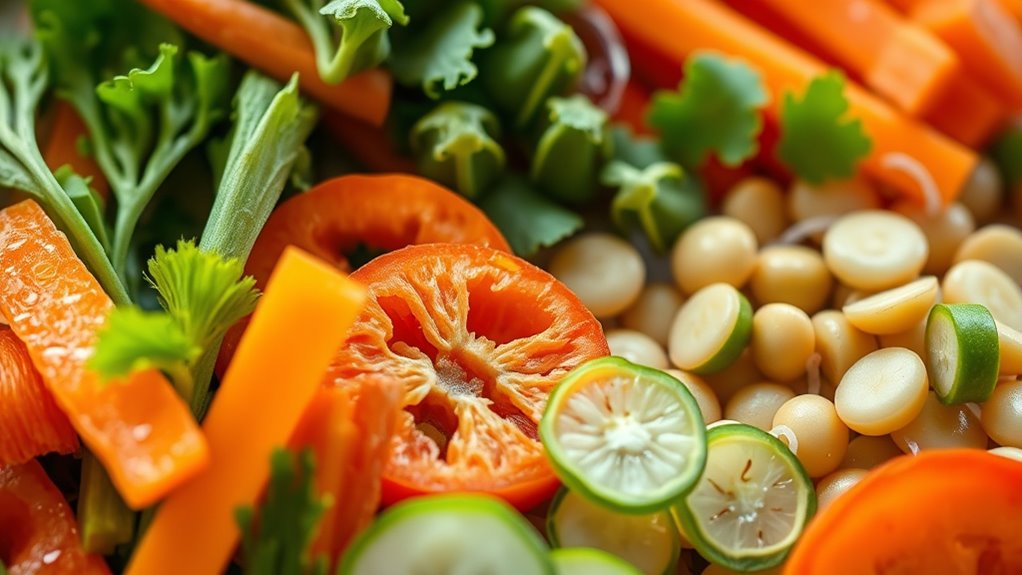
Cellulase is an essential enzyme that breaks down cellulose, the tough carbohydrate found in plant cell walls. When you consume raw plant foods, your body struggles to access the nutrients trapped inside these walls. By breaking down cellulose, cellulase helps release these nutrients, making them more bioavailable for absorption. This process improves fiber digestion, supporting your digestive health and helping you get the most from your plant-based foods. Without sufficient cellulase, the plant cell walls remain intact, limiting nutrient release and possibly causing digestive discomfort. Incorporating foods rich in cellulase or supplementing with the enzyme can enhance your ability to digest fiber effectively. Ultimately, cellulase plays a vital role in optimizing nutrient absorption by breaking down plant cell walls.
Catalase and Its Function in Neutralizing Free Radicals
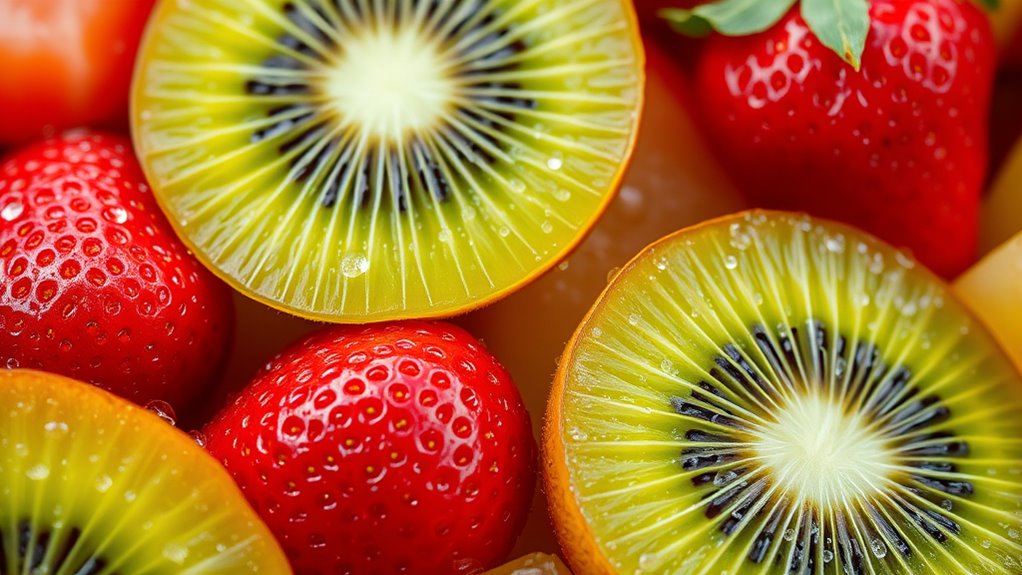
Have you ever wondered how your body protects itself from the damaging effects of free radicals? Catalase is a crucial enzyme that breaks down hydrogen peroxide, a harmful free radical, into water and oxygen. This process showcases enzyme synergy, where catalase works efficiently alongside other antioxidants to reduce oxidative stress. By neutralizing free radicals, catalase helps prevent cellular damage and supports overall health. Additionally, maintaining healthy enzyme activity enhances nutrient absorption, ensuring your body gets the most from raw foods. When catalase functions ideally, it:
- Protects cells from oxidative damage
- Boosts the body’s natural defense system
- Promotes overall vitality and longevity
Incorporating raw foods rich in catalase can considerably contribute to your body’s ability to combat free radicals effectively.
Lactase: Supporting Lactose Digestion in Raw Dairy Products
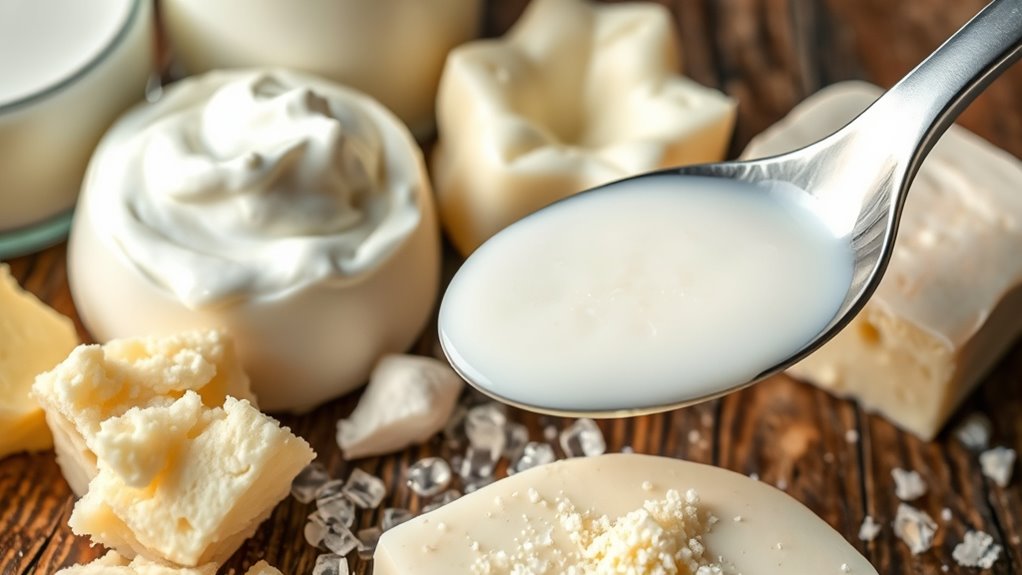
Just as catalase helps protect your cells from oxidative damage, enzymes like lactase play a vital role in ensuring your body can properly digest certain foods. Lactase is essential for breaking down lactose, the sugar found in dairy products. In raw dairy, natural lactase often remains active, supporting digestion during dairy fermentation or consumption. If you’re lactose intolerant, consuming raw dairy with active lactase can reduce symptoms like bloating, gas, and stomach discomfort. By maintaining enough lactase, your body can efficiently process lactose without needing supplements. Raw dairy products naturally contain this enzyme, making them a beneficial choice for those needing better lactose digestion. Supporting lactase levels helps you enjoy dairy products without digestive issues, especially when they’re minimally processed and rich in natural enzymes.
The Impact of Raw Food Enzymes on Overall Digestive Health
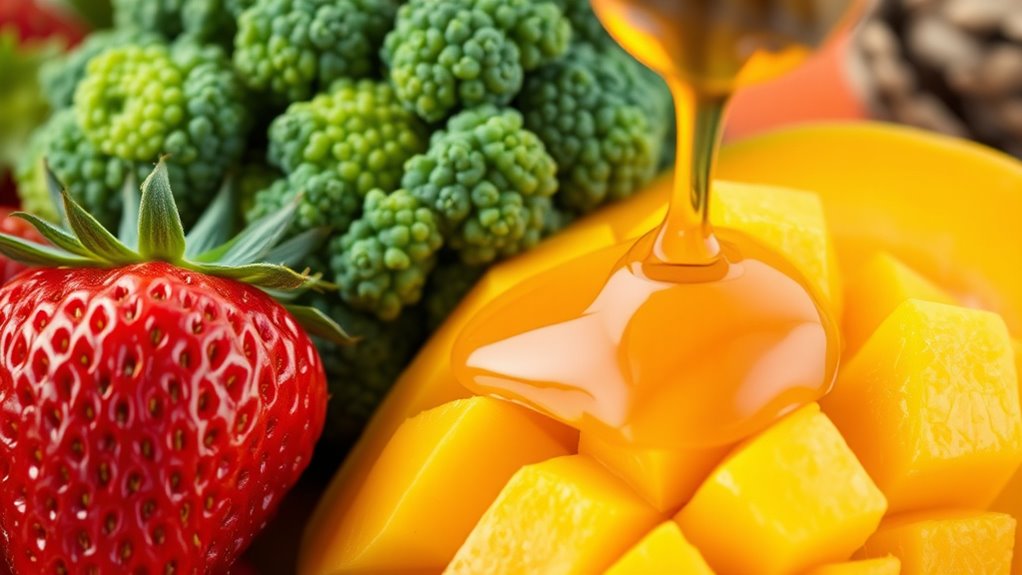
Raw food enzymes play a significant role in enhancing your digestive health by aiding the breakdown of nutrients and reducing the workload on your gastrointestinal system. When enzymes work in harmony through enzyme synergy, digestion becomes more efficient, helping your body absorb nutrients better. Additionally, raw food preservation preserves these essential enzymes, ensuring they remain active and beneficial for your gut. To maximize these benefits, keep in mind:
- Consuming raw foods preserves natural enzymes, supporting smoother digestion.
- Enzyme synergy in raw foods enhances nutrient absorption and reduces bloating.
- Proper raw food handling maintains enzyme activity, promoting overall gut health.
Frequently Asked Questions
How Do Raw Food Enzymes Survive Cooking Processes?
When you cook food, most enzymes are destroyed due to heat, but some enzyme heat stability allows certain enzymes to survive moderate temperatures. You can activate enzymes through methods like soaking or fermenting before cooking, which helps preserve their benefits. To maximize enzyme preservation, use gentle cooking techniques, avoid high heat, and consider raw or lightly processed foods. This way, you maintain enzyme activity and enhance digestion and nutrient absorption.
Can Enzyme Supplements Replace Natural Enzymes in Raw Foods?
When considering enzyme supplement efficacy, you might wonder if they can replace natural enzymes in raw foods. While supplemental enzymes can aid digestion, they often don’t match the bioavailability and diversity of enzymes found naturally in raw foods. Raw vs supplemental enzymes highlights that eating raw foods provides a complex blend of enzymes, supporting overall health better than relying solely on enzyme supplements. Therefore, supplements complement but don’t fully replace natural enzymes.
Are Raw Food Enzymes Effective for Individuals With Digestive Disorders?
You might wonder if raw food enzymes serve as a digestive aid for those with disorders. While they can support enzyme efficiency, their effectiveness varies from person to person. Some individuals find relief, as these enzymes help break down food more effectively. However, if your digestive issues are severe, it’s best to consult a healthcare professional. Raw food enzymes can complement your treatment but shouldn’t replace medical advice.
How Quickly Do Enzymes From Raw Foods Start Working in the Body?
Think of enzyme activation as a spark igniting a fire; it happens swiftly once raw foods reach your stomach. Typically, enzymes from raw foods start working within minutes, accelerating digestion speed and easing your gut’s workload. You’ll notice the effects as your body quickly breaks down nutrients, making digestion more efficient. So, fundamentally, your body welcomes these natural helpers, activating them promptly to support your digestive process.
Do Enzyme Levels Vary Between Organic and Non-Organic Raw Foods?
You might wonder if enzyme levels differ between organic and non-organic raw foods. Organic integrity often guarantees fewer chemicals and better preservation of enzyme stability, leading to higher enzyme activity. Non-organic foods may have reduced enzyme levels due to processing or pesticide use. So, choosing organic raw foods can help you access more natural enzymes, supporting better digestion and overall health.
Conclusion
By embracing raw foods, you gently invite a symphony of natural enzymes into your life. These quiet helpers support your digestion and nourish your body, turning everyday meals into nourishing experiences. When you choose raw, you’re softly nurturing your well-being, allowing nature’s delicate balance to work in harmony. In this way, you create a subtle, ongoing dance of health, where each enzymatic touch guides you toward a more vibrant, balanced life.
Aurelia is the Editor-in-Chief of The Graceful Kitchen, a vegan lifestyle blog that focuses on delicious, nutritious, and ethical eating. A lifelong vegan, Aurelia is passionate about sharing her love of plant-based cuisine with others. She is a regular contributor to several online and print publications, and has been interviewed by major news outlets about the benefits of a vegan diet. In her free time, Aurelia enjoys cooking, hiking, and spending time with her cats.





